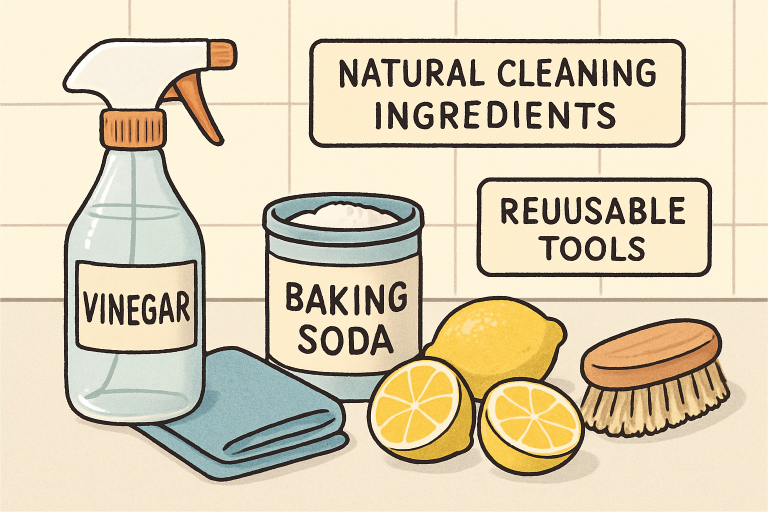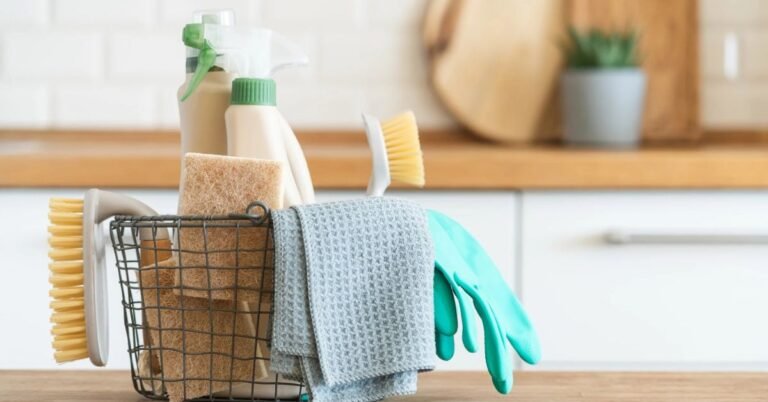Maintaining a clean home isn’t just about aesthetics—it’s about safeguarding the well-being and comfort of everyone under your roof. Traditional cleaning products, while undeniably effective, come with a hidden cost, as they often contain chemicals that linger on surfaces and in the air long after the scent has faded. These residues can affect indoor air quality, trigger allergic reactions, irritate sensitive skin, and contribute to long-term health issues for both humans and pets. By embracing eco-friendly cleaning solutions, you not only reduce your household’s exposure to these toxins but also support broader environmental goals. Eco-conscious cleaning methods are growing in popularity among homeowners who recognize their benefits. For those seeking an extra hand with sustainable results, professional maids Chicago, IL, can deliver thorough, eco-conscious residential cleaning services tailored to your needs.
Prolonged exposure to chemicals in conventional cleaners can cause skin irritations, respiratory problems, hormone issues, and health conditions. Children, who are in close contact with floors and surfaces, and pets, who can ingest residues, are especially vulnerable. Switching to gentle, plant-based, or homemade cleaners greatly reduces these risks. Natural products support healthier living, lower environmental pollution, and set a good example. This article offers tips for green cleaning, DIY recipes, and sustainable tools to make your home healthier and eco-friendly—without sacrificing cleanliness.
The Importance of Non-Toxic Cleaning Products
Many commercial cleaning products contain VOCs, harsh detergents, fragrances, and chemicals that harm air quality and cause health issues. These toxins can linger as fumes or residues, leading to respiratory problems, headaches, or allergies. Vulnerable groups like children, the elderly, and pets are at higher risk due to weaker immune systems. The Environmental Working Group reports hundreds of household cleaners don’t meet safety standards for transparency and toxicity. This has prompted more consumers to seek safer, natural alternatives based on plant extracts instead of petrochemicals. The CDC recommends using non-toxic solutions to reduce poisonings, improve indoor air, and protect vulnerable household members. Over time, such changes also lessen pollutants in waterways and soil, extending the benefits of greener cleaning practices.
Natural Ingredients for Effective Cleaning
Achieving a clean home can be accomplished using common, cost-effective household ingredients instead of expensive specialty cleaning products. Key eco-friendly agents include white vinegar, which effectively dissolves grease and sanitizes surfaces; baking soda, a mild abrasive that neutralizes odors and cleans tough stains; and lemon juice, known for its antibacterial properties and ability to remove stains and freshen the air. Other useful ingredients are liquid castile soap for general cleaning, hydrogen peroxide for stain removal, and essential oils for added aroma and antimicrobial benefits.

DIY All-Purpose Cleaner Recipe
Creating your own cleaning solutions can lower costs, reduce reliance on single-use plastics, and eliminate the need for additives. A simple recipe for a multi-purpose spray involves mixing equal parts white vinegar and water in a reusable spray bottle, adding lemon rind and rosemary for scent and antibacterial properties. Allow the mixture to steep for at least a week before use to maximize its effectiveness. This solution is suitable for cleaning various surfaces but should not be used on natural stone like granite or marble, as vinegar may etch these materials. For tough stains, combine with baking soda for enhanced cleaning power.
Eco-Friendly Cleaning Tools
To adopt green habits effectively, consider upgrading your cleaning tools and supplies. Replace single-use paper towels with reusable cloths made from organic materials, which not only reduce waste but also save money. Use glass or stainless steel spray bottles to minimize plastic waste and enhance the preservation of homemade cleaners. Opt for sustainable scrub brushes featuring renewable bamboo handles or recycled bristles to maintain cleaning efficacy while supporting eco-friendliness.
Benefits of Eco-Friendly Cleaning Practices
Transitioning to green cleaning practices offers several benefits: it improves air quality by reducing household pollution and allergy risk, promotes environmental conservation through the use of natural ingredients and reduced waste, increases cost efficiency by utilizing affordable pantry items for cleaning solutions, and provides peace of mind by ensuring a safer environment for children and pets.
Conclusion
Making the switch to eco-friendly cleaning solutions isn’t just a trendy lifestyle change—it’s a conscious decision with lasting positive effects for your family and the world around you. From using time-honored pantry staples and investing in reusable tools to making your own cleaning sprays, there are endless small steps that lead to a cleaner, safer, and more sustainable home environment. By taking these actions, you can enjoy all the benefits of a spotless living space without the health or environmental downsides associated with conventional products. Start today—as even the smallest changes to your cleaning routine can lead to cleaner living and a brighter, healthier future.

